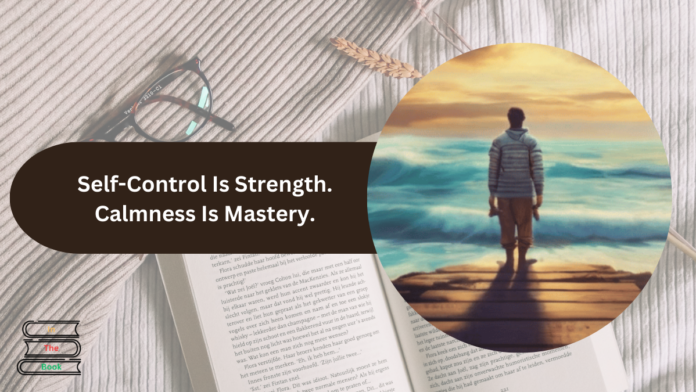In today’s world, where distractions are constant and emotions often run high, mastering self-control and calmness is not just a luxury but a necessity. These traits empower individuals to face life’s challenges with clarity and resilience. But what do these concepts truly mean, and how can you make them a part of your daily life? Let’s explore their significance and practical ways to embrace them.
Contents
- Why Is Self-Control Considered Strength?
- Key Benefits of Self-Control
- Examples of Self-Control in Action
- The Art of Calmness: Mastering Inner Peace
- Why Calmness Is Essential?
- Signs of a Calm Mind
- How to Cultivate Self-Control and Calmness?
- Practical Steps to Develop Self-Control
- Techniques to Embrace Calmness
- Inspiring Quotes to Reflect On
- Final Thoughts
Why Is Self-Control Considered Strength?
Self-control is the ability to regulate your emotions, thoughts, and behaviors in the face of temptations and impulses. It is a cornerstone of emotional intelligence and personal growth. People with self-control are better equipped to navigate difficult situations, maintain focus on their goals, and resist the urge to act on fleeting emotions.
Key Benefits of Self-Control
- Improved Decision-Making: A controlled mind processes information rationally, helping you weigh pros and cons before taking action.
- Enhanced Productivity: By avoiding distractions, you stay focused on tasks that align with your priorities.
- Stronger Relationships: Self-control allows you to respond with empathy instead of reacting impulsively, building trust and understanding.
- Better Health Habits: Those with strong self-discipline are more likely to stick to exercise routines, healthy diets, and self-care practices.
- Increased Resilience: It equips you to face setbacks with a calm and solutions-oriented mindset.
Examples of Self-Control in Action
| Scenario | Without Self-Control | With Self-Control |
|---|---|---|
| Responding to criticism | Reacting defensively or angrily | Listening calmly and seeking constructive feedback |
| Managing a craving | Indulging in unhealthy snacks | Opting for a nutritious alternative |
| Dealing with interruptions | Losing focus and procrastinating | Politely setting boundaries and staying on task |
The Art of Calmness: Mastering Inner Peace
Calmness isn’t about ignoring problems or suppressing feelings—it’s about managing your inner state to face external challenges with composure. A calm individual radiates confidence and inspires others, making it an invaluable quality in both personal and professional environments.
Why Calmness Is Essential?
- Facilitates Clarity: A calm mind is free from noise, making it easier to analyze situations and make sound decisions.
- Reduces Stress: Staying composed minimizes the impact of stressors on your mental and physical health.
- Strengthens Relationships: Calm individuals are better at resolving conflicts and fostering positive connections.
- Improves Leadership Skills: Calmness under pressure inspires confidence in others, making you a natural leader.
- Supports Long-Term Goals: By staying centered, you maintain focus on what matters most instead of being derailed by temporary challenges.
Signs of a Calm Mind
| Behavior | Impact |
|---|---|
| Speaking softly and thoughtfully | Encourages open dialogue and mutual respect |
| Maintaining steady eye contact | Builds trust and conveys confidence |
| Taking measured pauses | Shows you’re considering your words carefully |
How to Cultivate Self-Control and Calmness?
Building these traits is a gradual process that requires self-awareness, patience, and dedication. Here are actionable steps to help you strengthen your self-control and achieve inner calm.
Practical Steps to Develop Self-Control
- Set Clear Priorities:
- Identify your long-term goals and break them into smaller, manageable tasks.
- Create a daily schedule that aligns with these goals.
- Delay Gratification:
- Practice waiting before indulging in desires.
- Use rewards as motivation for completing important tasks.
- Limit Exposure to Temptations:
- Keep distractions like social media and unhealthy snacks out of reach.
- Surround yourself with supportive environments and people.
- Practice Self-Awareness:
- Monitor your emotional triggers and learn to manage them.
- Use tools like journaling to reflect on your behaviors and choices.
Techniques to Embrace Calmness
- Mindfulness Meditation:
- Dedicate 10–20 minutes daily to focus on your breath or a calming mantra.
- Practice being present and observing your thoughts without judgment.
- Controlled Breathing Exercises:
- Try the 4-7-8 technique: Inhale for 4 seconds, hold for 7 seconds, exhale for 8 seconds.
- Use this method to calm yourself during stressful moments.
- Develop a Morning Routine:
- Start your day with activities like stretching, reading, or quiet reflection.
- A calm morning sets the tone for a calm day.
- Adopt a Positive Mindset:
- Reframe challenges as opportunities for growth.
- Focus on what you can control rather than dwelling on the uncontrollable.
- Engage in Relaxing Activities:
- Explore hobbies like painting, gardening, or playing a musical instrument.
- Spend time in nature to rejuvenate your mind and body.
Inspiring Quotes to Reflect On
When the going gets tough, let these words serve as a reminder of the power within you:
- “The greatest victory is over oneself.” – Aristotle
- “You can’t always control what happens, but you can control how you respond.” – Unknown
- “Peace begins with a smile.” – Mother Teresa
- “Do not let the behavior of others destroy your inner peace.” – Dalai Lama
Final Thoughts
Self-control and calmness are the ultimate tools for navigating life’s complexities. They empower you to stay focused, handle stress effectively, and build meaningful connections with others. By cultivating these qualities, you’ll unlock your true potential and inspire those around you.
Start small, be consistent, and celebrate your progress. Remember, true strength lies not in dominating others but in mastering yourself. Calmness, paired with self-control, is the key to a life of balance, purpose, and fulfillment.
Click here to learn more

Chandler is an avid automobile enthusiast who is passionate about all things on wheels. From the latest car models to classic vintage rides, I love exploring the automotive world’s intricate details and engineering marvels. With years of experience in test-driving, reviewing, and analyzing cars, I provide readers with comprehensive insights and honest opinions.


























